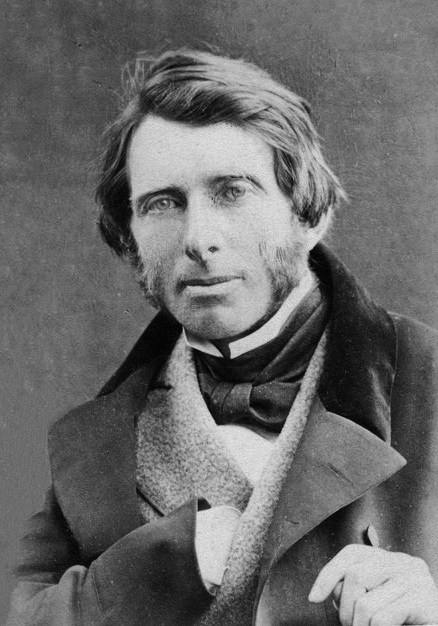Frases célebres de John Ruskin
Fuente: [Amate Pou], Jordi. Paseando por una parte de la Historia: Antología de citas. Editorial Penguin Random House Grupo Editorial España, 2017. ISBN 9788417321871, p. 117.
Fuente: [Marcelino Aranda], Mariana; [Ramírez Herrera], Dania. Administración de la Calidad: Nuevas Perspectivas. Grupo Editorial Patria, 2014. ISBN 9786074388169, p. 12.
John Ruskin Frases y Citas
“La sinceridad es la raíz de todas las virtudes.”
Fuente: [Muñoz], Asun. El baúl de los sueños. Editorial Palibrio, 2014. ISBN 9781463369644.
“La misma esperanza deja de ser felicidad cuando va acompañada de la impaciencia.”
Variante: La propia esperanza deja de ser una felicidad cuando va acompañada de la impaciencia.
Fuente: [Palomo Triguero], Eduardo. Cita-logía. Editorial Punto Rojo Libros, S.L. ISBN 978-84-16068-10-4, p. 120.
Fuente: [Barón Escamilla], Carlos. AC: Arquitectura de containers. Editorial Lulu.com, 2014. ISBN 9788461693177, p. 10.
“Más vale una muleta que la pérdida de un miembro.”
Ruskin condenaba la «restauración en estilo» de Viollet-le-Duc y sus seguidores en Inglaterra de los monumentos y edificios antiguos; consideraba la restauración tan imposible «como resucitar a los muertos», y sólo admitía intervenir para paliar preventivamente que el monumento se disgregue, o consolidar con vigas cuando se hunda, y de ahí la expresión de la cita.
Fuente: [García Morales], M.ª Victoria; Victoria [Soto Caba], Joaquín [Martínez Pino]. El Estudio del patrimonio cultural. Editorial Centro de Estudios Ramon Areces, S. A., 2017. ISBN 9788499612140, p. 185.
John Ruskin: Frases en inglés
Sesame and Lilies, lecture I: Sesame. Of King's Treasuries, section 3 (1864-1865)
Fuente: The Seven Lamps of Architecture (1849), Chapter VII: The Lamp of Obedience, section 1.
Fuente: Dictionary of Burning Words of Brilliant Writers (1895), P. 134.
Fuente: The Seven Lamps of Architecture (1849), Chapter IV: The Lamp of Beauty, section 19.
Mornings in Florence, part III, section 49 (1875).
“An unimaginative person can neither be reverent nor kind.”
Fors Clavigera, letter xxxiv (October 1873).
Fors Clavigera (1871-1878 and 1880-1884)
Lecture V, section 82.
The Eagle's Nest (1872)
“Life without industry is guilt, and industry without art is brutality.”
Lecture III
Lectures on Art (1870)
Fuente: Dictionary of Burning Words of Brilliant Writers (1895), P. 122.
Volume III, part IV, chapter XII (1856).
Modern Painters (1843-1860)
Volume V, part VIII, chapter 1, section 4 (1860).
Modern Painters (1843-1860)
Known as the Common Law of Business Balance, this quotation has been widely attributed to Ruskin but has never been sourced to any of his works.
[Shapiro, Fred R., The Yale Book of Quotations, 2006, Yale University Press, New Haven, 657]
Disputed
Fors Clavigera, letter xxxvii, (1 January 1874).
Fors Clavigera (1871-1878 and 1880-1884)
Fuente: Dictionary of Burning Words of Brilliant Writers (1895), P. 438.
The Crown of Wild Olive, lecture I: Work, sections 23-24 (1866).
Time and Tide, letter VIII (1867).
Volume III, part IV, chapter XVI (1856).
Modern Painters (1843-1860)
Volume II, part III, chapter V (1846).
Modern Painters (1843-1860)
Cestus of Aglaia, chapter VI, section 72 (1865-66).
Preface to the first edition, 1865
The Ethics of the Dust (1875)
“The work of science is to substitute facts for appearances, and demonstrations for impressions.”
Volume III
The Stones of Venice (1853)
Volume II, chapter VI, section 62.
The Stones of Venice (1853)
Fuente: Dictionary of Burning Words of Brilliant Writers (1895), P. 405.
Lecture V, section 88.
The Eagle's Nest (1872)
Volume III, part IV, chapter VII (1856).
Modern Painters (1843-1860)
Fors Clavigera, letter lxxvi (4 March 1877).
Fors Clavigera (1871-1878 and 1880-1884)
Volume V, part VIII, chapter I, section 2 (1860).
Modern Painters (1843-1860)
